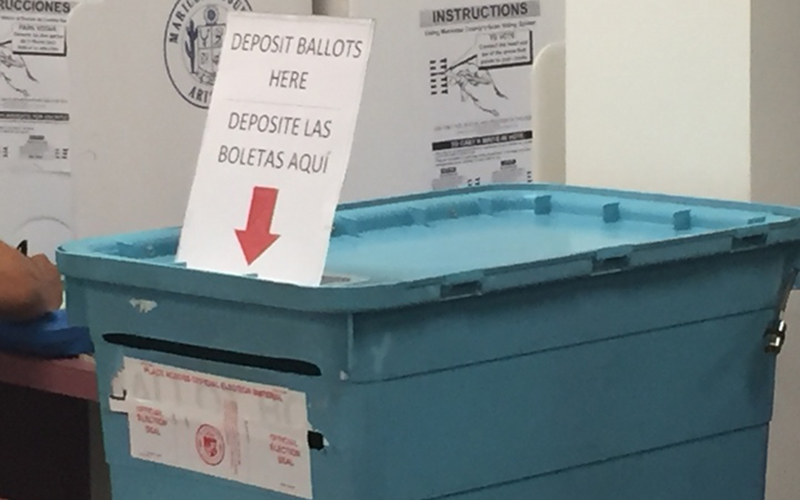
A ballot box at the Maricopa County Recorder’s Office contains ballots from early voters in the 2016 general election. The U.S. Supreme Court let stand a law on ballot harvesting Saturday, the latest in a hectic week of legal challenges to the state’s election laws. (Photo by Sean Pepper/Cronkite News)
WASHINGTON – The U.S. Supreme Court on Saturday reinstated Arizona’s ban on ballot-harvesting, just one day after the 9th U.S. Circuit Court of Appeals put the law on hold.
Arizona Secretary of State Michele Reagan late Friday had asked the Supreme Court to step in, saying the circuit court’s injunction coming so soon before Tuesday’s elections would “confuse voters and depress turnout.”
But critics – some who rushed into the brief window Friday to collect ballots – have argued that allowing the law to be enforced would handicap minority and low-income voting efforts.
The full Supreme Court, without comment and without dissent Saturday, stayed the injunction until the circuit court’s hearing on the case in January, meaning the 2016 law will be in effect for Tuesday’s elections.
The back-and-forth on the ballot-collection law capped a hectic week in which the circuit court reversed itself twice on Democratic challenges to Arizona election laws; a district court refused to order enrollment of 2,069 people who missed a voter registration deadline; and Democrats went to court alleging a coordinated voter intimidation campaign by Republicans.
In a statement Saturday, Reagan said she was “extremely pleased” by the Supreme Court’s action, adding that the “commonsense law simply ensures ballot security in the state of Arizona and we’re relieved that there will be no changes to the law this late in the election cycle.”
The injunction Friday by the 9th Circuit came just four days before the Nov. 8 presidential election – a point not lost on some circuit judges.
“I fear our action in this case will set a precedent that will harm not only the current election in Arizona, but presumably many more down the line, whenever a state enacts a voting regulation that more than half of the active judges on the Ninth Circuit simply deem unwise,” Circuit Judge Diarmuid O’Scannlain wrote Friday.
O’Scannlain, joined by four other judges in his dissent, said the Supreme Court has advised against last-minute interference in elections, but the circuit court was doing just that, “while voting is already underway and only four days before Election Day.”
But Chief Judge Sidney Thomas wrote for the court that delaying enforcement of the law would not affect the election because it would “not affect the state’s election processes or machinery.”
“The injunction … would not change the electoral process, it simply would enjoin enforcement of a legislative act that would criminalize the collection, by persons other than the voter, of legitimately cast ballots,” Thomas wrote. He also wrote that the court had a chance for “detailed consideration” of the issues before issuing its injunction.
The law in question is HB 2023, passed by the Legislature this year, which says only a family member, household member, caretaker or postal worker can handle another person’s ballot. Supporters said the law is needed to prevent voter fraud and protect the integrity of the voting process.
But critics said the state could not provide one example of voter fraud and argued that the law is aimed at disenfranchising minority and low-income voters, who are more likely to rely on ballot collection.
The same argument – that it disproportionately affects minority groups – was raised against the state’s decades-old ban on voting in person anywhere but at your assigned precinct. A three-judge panel of the circuit court upheld that law Wednesday, but the full court said Friday it would rehear that decision.
The court set a hearing on the ballot-collection issue for Jan. 17, and blocked enforcement of the law until then. It has not set a hearing date on the “out-of-precinct” voting law.
While the circuit court insisted its decision would not affect the elections, U.S. District Judge Steven Logan pointed to the calendar as one reason he opted not to order an extension of voter registrations.
State and national Democratic groups had sued Reagan after her office refused to extend the voter registration deadline, which fell on Columbus Day, Oct. 10. They argued that not extending the deadline “violated federal and state law and imposed an unconstitutional burden on voters” while disenfranchising at least 2,069 would-be voters who tried to register on Oct. 11.
Logan agreed that the state should not have set the voter registration deadline on a federal holiday, but said that changing the deadline just four days before Election Day would endanger individual voting rights.
“Polling lists have been disseminated, early ballots have been cast, and polls open in a matter of days,” he wrote.
Ordering the registration of those voters who missed the deadline would vindicate the voting rights for some while potentially “endangering the exercise of that right by others.”
He said both the state and the Democratic plaintiffs share some of the blame. The outcome might have been different if Democrats had sued “within a reasonable time before the voter registration deadline,” he wrote, but added that if Reagan had looked at a holiday calendar before setting registration deadlines “the predicament faced here could have been avoided.”
Adam Gitlin, of New York University’s Brennan Center for Justice, said it is not immediately clear what impact – if any – these lawsuits will have on the election.
“Last-minute litigation should, hopefully, not cause too much confusion and voters should confidently cast their ballots,” Gitlin said.
“This is not an election that anyone should sit out,” he said. “The faction in the courts came late in the game, but voters should still head to the polls Tuesday.”